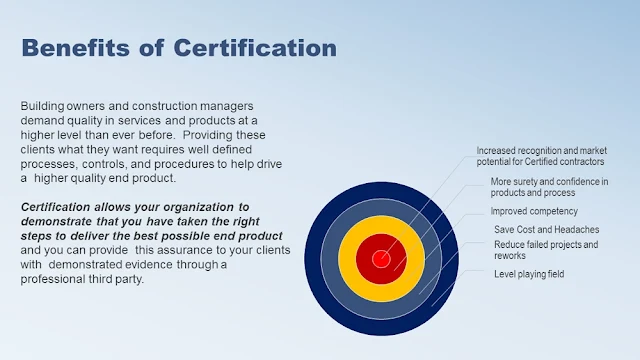Benefits of Certification
Benefits of Certification
 |
| Benefits of Certification |
In fields such as coaching, accounting, and acupuncture, documentation is a formal process of making certain that the individual is qualified in conditions of particular knowledge or skills and provides the relevant activities as well. Certification programs are often made by or monitored by some certifying firm, such as a professional association. In some situations, documentation can easily be gain access to by members of such associations only. Other requirements for certifications includes educational qualifications, understanding of a particular trade as per the certifying bodies Book of Knowledge (BOK), certain years of documented experiences, sources from employees and many more prerequisites.
Professional body such as accountancy systems begun to realise the value of documentation given the trend of recruiting participants into professional. Such teachers will not be inclined to shell out long periods as interns and pay attention to while learning. A quicker way for them to establish themselves is to get certificated in some specialised area such as management accounting, internal audit or forensic accounting. See List below for examples of such certifications.
- Certified Internal Auditors (CIA) by Institute of Internal Auditors
- Certified Business & professional Accountants (CCIA) from the Institute of economic and Industrial Accountancy firm Malaysia
- Certified Internal Control Management Professionals (CiCMP), GRC Sox Group
- Certified Scams Examiner (CFE) Association of Certified Fraud Examiners
You may also be interested: COMLEX Study Materials
Issues in Certifications
Accreditations will benefit individuals as well as the organizations they help. Benefits for firms includes the likelihood of staff being trained to a steady skills level and well as having skills that are benchmarked to recognised criteria. Certificated people are typically more effective and work to steady standards. Certification can reduce downtime, because personnel have the skills needed to handle issues as they arise - and that certified people made more use of your product's advanced features and can deploy new products with greater easiness. Gaining certifications can be aligned to performance-related pay allowing companies to acquire easily available benchmarks to basic such decisions on. Various other benefits includes lower personnel turnover and better customers satisfaction.
On the person level, certified people are more employable: according to an IDC white newspaper, "Sixty-three percent of selecting managers believe certified people are more productive than their non-certified counterparts[1]. very well Certified individuals could earn more: a survey of MCPs by IDC found that 43% got a pay rise after attaining their certification[2]. A lot of certifications make you part of your professional network, for example, Microsoft Certified Specialists belong to a household area that only they can access.
Certification confers to the recipient an identification that carries with it economical value as the certified personal is in an improved position to obtain a service contract or charge more than another similarly skilled person without certification. This kind of places much importance on the quality of the documentation itself and the due process that will go into it to ensure that the certified person is of the approved standard and is in position to maintain it. Webster[3] recommended that the most common due process is the right to reapply for documentation or retake the documentation exam. Indeed, re-examination nearly eliminates the likelihood of recurring clerical or computational errors. Accordingly, most recognition bodies requires authorized members to maintain or enhance their skills by processing themselves to Continuous Specialist Development. For example, Authorized Internal Auditors of the Institute of Internal Auditors Malaysia (IIAM) need to obtain 80 hours of training every 2 years[4]. Some professional physiques like the Board of certified Safety Professionals requires their Certified Safety Specialists to be recertified [5] every 5 years.
[1] Resource: The good quality peace of mind (QA Limited ) website
[2] Source: The good quality assurance (QA Limited ) website
[3] Paper on Legal Issues in certification, offered by Hugh K. Webster at the CESB 2k Certification Symposium held March 8, 2000 in Alexandria, Virginia.
[4] Supply: Institute of Internal Auditor of Malaysia
[5] Source: Board of Qualified Safety Professionals



Comments
Post a Comment